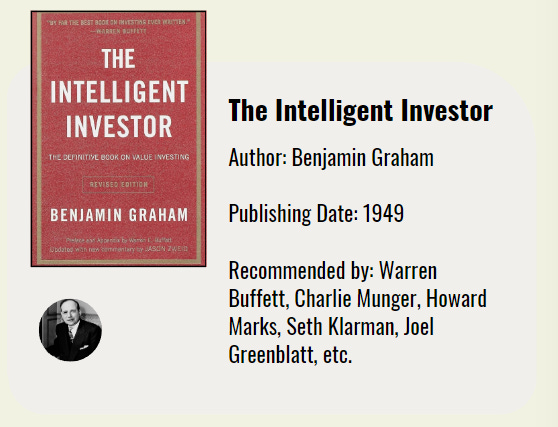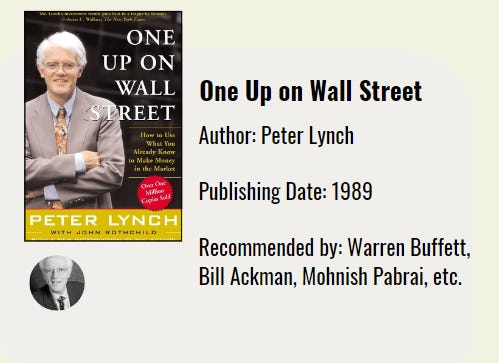The Top 10 Most Recommended Books by World-Class Investors
One of the best places to look for new investing opportunities is beaten-down industries. One of those industries is the Cannabis industry.
The sector was an investor’s favorite in 2021. As often happens with these hypes, stock prices (rightfully) decreased massively in the months and years ahead.
Now, there are profitable companies that simply suffer from the sector's negative sentiment. That’s a good setup to look for opportunities. When I find something interesting, I’ll pitch it here.
Subscribe so you never miss an investing pitch:
The Top 10 Most Recommended Books by World-Class Investors
I’ve dug through the book recommendations of countless investing professionals, especially the greats like Buffett, Munger, Marks, etc.
There are some books that all of them have used to study investing. Today, I’ll share the list of books that were most often recommended.
If you’re an experienced investor, you’ll probably know many of these. To give you more reading inspiration as well, I will soon share a less-known list of investors’ favorite books.
But for now, let’s get straight into this list. We’ll go from best-Known to Least-Known:
1. The Intelligent Investor
Of course, we have to start with the bible of value investing. Benjamin Graham’s The Intelligent Investor. It’s by far the most recommended book among the investing elite.
However, in recent years, more and more people have said they wouldn’t even put it in their top 10. In my opinion, this book has an unfair disadvantage. Its ideas have been shared and recycled in almost all (value) investing books published after.
Thus, the content of The Intelligent Investor can be found in numerous other books and articles that might do a better job of being entertaining at the same time.
It’s not necessarily a fun read. Nevertheless, I’d still recommend this book because it touches everything important to value investing. Few other books do that.
2. One Up on Wall Street
This is one of two books by Peter Lynch on this list. It’s definitely an easier read than Graham’s work, and it shows that Lynch is not only a great investor but also a speaker and author.
It was one of the first books I read on investing, and it was an important read for me. Like most other small individual investors, I wondered in the beginning if stock picking makes any sense when there are institutions with billions of dollars focused on researching companies and being faster than oneself.
One Up on Wall Street was the book that introduced me to the structural advantages small investors can have and why big banks and funds struggle to outperform the markets.
3. You can be a Stock Market Genius
This book focuses more on the “practical” side of investing. Joel Greenblatt shows how to capitalize on special situations like spinoffs, restructurings, and mergers — opportunities often overlooked by Wall Street.
He uses real-world examples and does a good job of simplifying these topics so that not only experienced but also newer investors can understand them. Still, this shouldn’t be your first book on investing.
If you already have experience, it is a must-read.
4. Common Stocks and Uncommon Profits
Philip Fisher had a major influence on Warren Buffett’s investing strategy, especially as Buffett’s assets under management grew. Fisher is known for his quality investing approach, which is similar to what Munger preached.
Fisher’s strategies focus on evaluating a company’s management, innovation, and growth potential, offering a thorough framework for identifying companies that outperform the market over time.
One of the research methods he popularized is the Scuttlebutt method. It involves gathering information about a company by talking to its direct stakeholders—employees, customers, suppliers, competitors, and industry experts.
By tapping into these first-hand sources, investors can uncover insights that may not be visible through standard analysis, providing a fuller picture of the business’s potential.
5. Security Analysis
Like Peter Lynch, Benjamin Graham also made it onto this list with two books. Security Analysis is even older than The Intelligent Investor; thus, some people consider it outdated. Benjamin Graham didn’t write it alone, though. David Dodd, a colleague of Graham, co-authored it.
It is much more accounting-focused than The Intelligent Investor, making it more complex. The “old age” doesn’t necessarily help. I think it deserves a place on this list, but I would recommend it only to very experienced investors.
6. Poor Charlie’s Almanack
One of my favorite books and regular evening reads. Poor Charlie’s Almanack is a compilation of speeches given by Charlie Munger. It’s a must-read for Munger fans and offers lessons on life, learning, and investing.
As you all know, Munger wasn’t as focused on investing as Buffett is. This book shows that. However, even if you’re just tuning in for the investing wisdom, it’s worth it.
7. Beating the Street
In contrast to One Up on Wall Street, Beating the Street is more autobiographical. It gives readers a behind-the-scenes look at how Lynch managed the Magellan Fund, including case studies of specific stock picks and fund performance.
It is more instructive and methodical, offering a more detailed look into the process of investing rather than investing philosophy.
8. Principles
In his book Principles, Ray Dalio offers a combination of personal and professional wisdom that guides readers toward effective decision-making and personal and professional success.
Drawing from his experiences as the founder of Bridgewater Associates, Dalio shares insights on cultivating an open-minded culture, embracing reality, and understanding the importance of principles in both life and work.
The book provides actionable frameworks for tackling challenges and improving relationships, making it a great read for anyone seeking clarity and purpose.
9. The Most Important Thing
In this book, Marks plays with the idea that there is something like “the most important thing” in investing. In reality, there are a number of rules and lessons that have to be combined in order to become a successful investor.
In this book, he outlines all these rules and lessons, with a specific focus on market cycles, risk management, and long-term thinking—the same themes that we can also read about in his Oaktree Investing Memos.
I personally liked the book a lot and would recommend it to every new investor. It is also a great read for experienced investors who haven’t yet read his memos.
10. The Little Book of Common Sense Investing
Last but not least, The Little Book of Common Sense Investing by John C. Bogle, the father of index funds and founder of Vanguard. Bogle advocates for low-cost, passive index funds that track the overall market.
With clear explanations and compelling evidence, Bogle shows how simple, long-term investing can outperform complex strategies. This book is a good read, even if you’re a stock picker like me ;).
The long-term thinking and importance of patience and minimizing mistakes that most active managers make is very helpful for everyone who wants to compound his wealth.
You can find more book recommendations on my Bookshelf.
Have a great day!
Daniel












